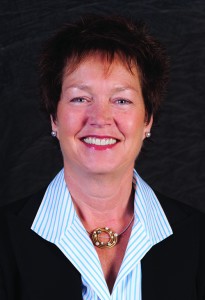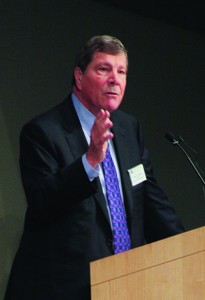This article first appeared in the UConn Business magazine, Volume 3, Issue 2 (Spring 2013)
The city of Stamford in Fairfield County, Connecticut, has been listed by Forbes Magazine as one of the best places for business and careers. Nestled along picturesque Long Island Sound, this bustling business community houses numerous Fortune 500 companies and many notable investment management firms.
And when you enter the title of “financial analyst” into the search engine of the Stamford-based job site Indeed.com, you’ll be rewarded with approximately 900 advertised openings within a 25-mile radius.
There is a high demand for positions in the financial services sector, and to meet this growing need, the UConn School of Business is launching an undergraduate Financial Management major at the Stamford campus which is uniquely designed to fit the needs of the business base in Fairfield County.
According to Robert A. Johnson, a sernio Stamford business student, “my job and focus is in the Stamford area, and I want to graduate from UConn with a Finance degree. Now I can do this and not have to attend the Storrs campus for more than a semester.”
The proposed major makes sense to employers on the Gold Coast as well. As Peter Ijomah, Director of Engineering, Service Management at Travelers, aptly notes, “once students can graduate from Stamford with a Finance degree, we can recruit more students from the Stamford campus for our employment needs in our finance department.” While the proposed curriculum will require the same general education courses as the School’s traditional business majors, it differs from the mainstream finance major offered at the main Storrs campus in that its courses are constructed to prepare students for careers in corporate money management and investment.
The plan of study aims to ready students for the Level 1 Chartered Financial Analyst (CFA) exam, a standard of excellence in the investment community. The major will continue to link with the Stamford Chartered Financial Analyst Society (SCFAS), which was instrumental in its curriculum development, to apply for the status of CFA Program Partner. This distinction would signal to the business community that it is rooted in professional practice, embraces professional standards of ethics and well prepares students for the exams.
The major will also integrate with the new Investment Management Program (IMP) hosted by the local SCFAS. The IMP will allow for guest lecturers and mentoring directed at providing students with local industry-specific support mechanisms and instilling strong ethical behavior, practical knowledge and a current exchange of ideas. Michael Dineen, Senior Vice President of Atlantic Asset Management, notes “the partnership uniquely exposes students to a structured program closely tied to professional practice and a level of mentoring support well suited for a highly competitive marketplace.”
UConn’s new Financial Management major just may be the return on investment that the Fairfield County financial world has been hoping for.

 Colleen McGuire is the Director of the Graduate Business Learning Center, 100 Constitution Plaza Hartford, CT and is responsible for the
Colleen McGuire is the Director of the Graduate Business Learning Center, 100 Constitution Plaza Hartford, CT and is responsible for the  The
The 